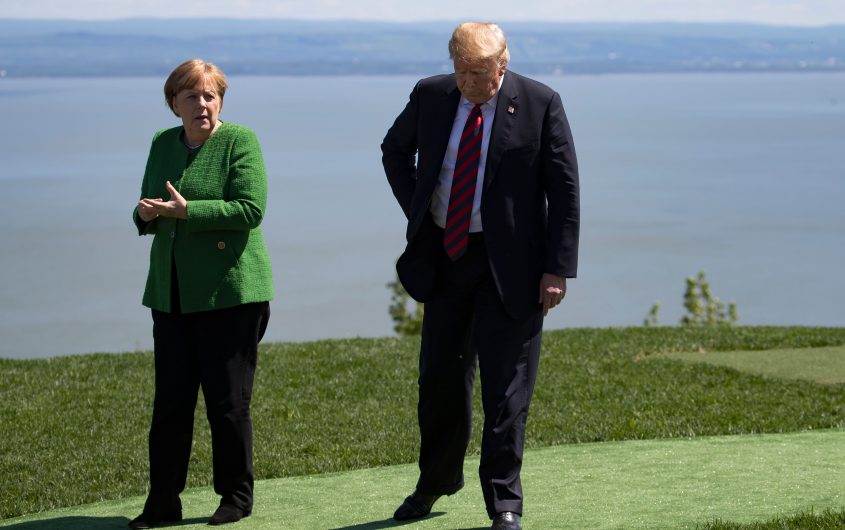
IAN LANGSDON/POOL/AFP/Getty Images
The Trump War on Germany

Stephen F. Szabo
Senior Fellow
Dr. Stephen F. Szabo is a Senior Fellow at AICGS, where he focuses on German foreign and security policies and the new German role in Europe and beyond. Until 2017, he was the Executive Director of the Transatlantic Academy, a Washington, DC, based forum for research and dialogue between scholars, policy experts, and authors from both sides of the Atlantic. Prior to joining the German Marshall Fund in 2007, Dr. Szabo was Interim Dean and Associate Dean for Academic Affairs and taught European Studies at The Paul H. Nitze School of Advanced International Studies, Johns Hopkins University. He served as Professor of National Security Affairs at the National War College, National Defense University (1982-1990). He received his PhD in Political Science from Georgetown University and has been a fellow with the Alexander von Humboldt Stiftung, the Woodrow Wilson International Center for Scholars, and the American Academy in Berlin, as well as serving as Research Director at AICGS. In addition to SAIS, he has taught at the Hertie School of Governance, Georgetown University, George Washington University, and the University of Virginia. He has published widely on European and German politics and foreign policies, including. The Successor Generation: International Perspectives of Postwar Europeans, The Diplomacy of German Unification, Parting Ways: The Crisis in the German-American Relationship, and Germany, Russia and the Rise of Geo-Economics.
After the most recent visit to Washington by Chancellor Merkel in April, a German diplomat came away from the brief working meeting with the president with the clear conclusion that “Trump views Germany as the enemy.” Events since then have only confirmed this assessment. The president’s tweets and those of his ambassador in Berlin have escalated the anti-German, anti-EU, and anti-Merkel rhetoric to depths never seen before in the German-American relationship. The low point before this was probably the split between George W. Bush and Gerhard Schröder over the Iraq War. As bad as that was, it did not concern the core of the transatlantic relationship. While Condoleezza Rice spoke of a “poisoned relationship” with Germany and Donald Rumsfeld dismissed “old Europe,” the Bush administration did not go after trade, NATO, the EU, or the community of values between Germany, Europe, and the United States. No one in that administration could have been accused of being pro-Russia.
All of this has changed as this American president continues to undermine all the pillars of U.S. policy toward Germany and the European Union. On the defense side, things will only get worse at the upcoming NATO summit, which will be followed by the Trump-Putin summit. The president has reportedly sent a harsh letter to Chancellor Merkel stating, “As we discussed during your visit in April, there is growing frustration in the United States that some allies have not stepped up as promised […] The United States continues to devote more resources to the defense of Europe when the Continent’s economy, including Germany’s, are doing well and security challenges abound. This is no longer sustainable for us.” A recent article in the Washington Post reports that the Pentagon is analyzing the cost and impact of pulling U.S. troops out of Germany.
It should be noted that Germany and its leadership are far from blameless for this state of affairs. The Merkel governments have consistently underfunded defense, a trend which goes back to the 1990s. When Germany unified in 1990, it was spending close to 2 percent of its GDP on defense and the Bundeswehr had the largest European military in NATO with over 400,000 soldiers. Today the defense budget makes up around 1.2 percent of GDP with a goal of increasing this to 1.5 percent by 2024. The Bundeswehr is in a woeful state with major equipment shortages and maintenance deficiencies. Combine this with soaring current accounts and trade and budget surpluses, and Trump has a case (made by President Obama as well) that Germans should seriously address.
The Bundeswehr is in a woeful state with major equipment shortages and maintenance deficiencies.
All this seems quite Undeutsch. The Germans have long been known for their pessimism, so it is surprising that a country which always expects the worst can neglect developing an insurance policy against that future. This policy has been provided by the United States and it is now clear that it will not be renewed at current rates. The chancellor has made it clear that Europe can no longer depend on America but has not forcefully followed through on the implications of this assessment. Her Social Democratic coalition partners, especially her SPD finance minister, have prevented any serious increase in defense capabilities on the grounds that this would be caving in to Trump’s bullying. This neglects the clear and present German interest in doing this absent Trump. Now that Germany has moved into a prolonged period of political instability and a terminally weakened chancellor, unfortunately little can be expected in terms of a renewed emphasis on defense.
On the American side, the American president was reportedly surprised that the U.S. has 35,000 military personnel stationed in Germany (down from a peak of 240,000 during the Cold War). He seems to think that these troops are there to defend a free-riding Germany but does not understand that, while they present a deterrent to possible Russian threats, their main purpose has been to serve as a platform for operations in the Middle East and South Asia. They are a relatively inexpensive platform given that some of their costs are offset by the German government. To redeploy these forces back to the U.S. would be more expensive than keeping them where they are and would open the question of how the U.S. will support operations in South Asia and the Middle East, not to mention to continue deterrence in eastern Europe and the Baltics. The frontal assault on the German government may also end up weakening cooperation on counterterrorism, the cyber war, and the German role in the NATO Baltic force and the NATO effort in Afghanistan.
He seems to think that these troops are there to defend a free-riding Germany but does not understand that, while they present a deterrent to possible Russian threats, their main purpose has been to serve as a platform for operations in the Middle East and South Asia.
While the president’s views are bad enough, the lack of any serious push back by Republicans in Congress is astonishing and reflects the polarized nature of American politics. The recent visit by a delegation of Republican Senators to Moscow is just the latest example of this partisan divide over what was a consensus issue in American national security. Republicans have been firm supporters of both NATO and the European Project ever since Senator Arthur Vandenberg joined forces with the Truman administration to support the Marshall Plan. Benn Steil’s timely new history, The Marshall Plan: Dawn of the Cold War, is worth a read today for all those Republicans on the Hill who are acquiescing to this war on Germany and Europe. Republican leaders in states like Tennessee, Alabama, and South Carolina, where German companies (most related to car production) are now employing over 600,000 Americans, should also make their views known on the threatened tariffs on the German automobile industry. The Harley Davidson push back will be minor in comparison to what will follow a war on European autos.
German deficiencies are matters for negotiation but should be balanced against the importance of the larger relationship. They are hardly grounds for a larger conflict. The Trump war on Germany risks repeating the German mistakes of the twentieth century of fighting two-front wars. With China now the main challenge, the U.S. cannot afford alienating a natural ally when it needs it most and undermining the European security system which has been a vital U.S. interest for seven decades.
A version of this article was published in the Frankfurter Allgemeine Zeitung on July 26, 2018.








